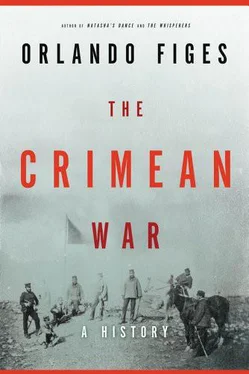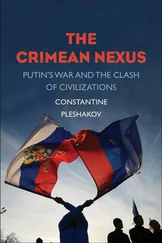Rowe, John, Storekeeper (army commisariat), brings in wounded
Rowlands, Capt Hugh (Derbys Regt)
Royal Marines, at Balaklava
Royal Navy: ability to threaten Russia attack on Odessa (1854) Baltic campaign (1854) Baltic campaign (1855) at Beykoz Bomarsund bombardment bombardment, of Sevastopol defence of invasion convoy fleet moved to Besika Bay (1833; 1849 & 1853) forces Russo-Turkish armistice (1878) helps quieten Constantinople demonstrations Kerch raid (1855) Naval Brigade, on shore artillery put on war footing (1853) sails to Alexandria (1840) see also Great Britain
Royal Patriotic Fund for the relief of soldiers wives
Rumelia (Bulgaria), massacre of Christians
Rumelian army (Ottoman): commencement of hostilities against Russia Stara Zagora (1853) strengthen’s Turkish forts on the Danube border terror tactics
Rumiantsev Library and Museum
Russell, Lord John alternative plan for Turkey represents Britain at Vienna Conference (1855)
Russell, William ( Times war correspondent) report on the Kerch raid reports draw attention to bravery in the field upsets military establishment visits military cemeteries wounded found in Sevastopol
Russia: aims to be a southern power Anglophobia armed forces discredited by Crimean defeat Austrian Four Points accepted autocracy failure Bessarabia loss a national tragedy Black Sea fleet recommissioned boundary dispute in Bessarabia brink of war with Britain over the Vixen (1836) British plans to break up the Russian Empire calls for war against Turks (1820s) campaigns for return of Crimea from Ukraine ‘conflicting memories of 1812 Congress of Berlin resolutions conquest of khanates in Central Asia corruption and incompetence Cossack traditions Danubian principalities and declares war on Turkey (1828) defences thinly spread demands extradition of Polish refugees from Ottomans demands new Orthodox Church protection treaty dependence on a serf economy diplomatic relations with Britain and France broken (1854) dispute with France over the Holy Land drops France as an ally ecclesiastical mission in Jerusalem economics of serf emancipation expansionist aims see ‘Testament of Peter the Great’; feelings of betrayal by Western Christians forced to give up Kars Foreign Ministry free passage through Dardanelles for shipping and French territorial ambitions (Nice and Savoy) gains from Adrianople Treaty (1829) gains territory in the Far East (1860) gives up privileges vis-à-vis Ottomans (1841) Greeks lobby for help at Tsarist Court and Holy Sepulchre roof dispute humiliation and pride from Sevastopol imperial rivalry with Great Britain importance of cereal exports influence on other Orthodox communities insists on Hatt-i Hümayun clause in Paris Congress invasion and siege of Kars liberal circles critical of war Ministry of Education Ministry of Finance Ministry of the Interior Ministry of War national myth of Sevastopol need for modern infrastucture need to modernize defences an Orthodox Crusade Paris Peace Congress (1856) peace feelers to Austrians and French (1855) perceived threat to India plans for a partisan war and Poland possibility of revolutionary disturbances preparedness for war (1853) pressures Ottomans over French demands railways rapprochement with France reaction to Bulgarian atrocities reactions to the War reformist spirit relations with America religious destiny of resentment against Europe response to defeat at Inkerman response to Franco-Austrian proposals for peace (1855) response to loss of Sevastopol response to 1848 revolutions in Europe rumours about death of Tsar Nicholas rumours about freedom for serfs who enlist rumours of international events and actions San Stefano Treaty seen as enemy of liberty by France serf emancipation serf illiteracy serf uprisings Serpent Island occupied state commemorations of Sevastopol struggle to control buffer zones support for France over Austrian War (1859) support for Ottomans against Egypt (1833) support for Prussia support for Serbia tests the Paris Peace Treaty (1856) thought of as semi-Asiatic uncivilized Three Emperors’ League (1873) tight press censorship trade competition with Britain Treaty with Great Britain and France (1827) Treaty of Unkiar-Skelessi and wars with Muslim neighbours ‘weak neighbour’ policy see also Alexander II, Tsar; Nicholas I, Tsar; pan-Slavism; Soviet Union
Russian army: forced to withdraw from Warsaw (1830) defeats the Poles (1831) army reforms dead and wounded defeats Hungarians (1849) defences thinly spread desertions in Bucharest desertions at Chernaia river desertions from Sevastopol diet in Danube delta drinking entertainments harsh treatment of serf soldiers (Tolstoy) indecisive skirmishes with Ottomans (1853) losses due to disease in campaigns medical help from the USA medical treatment before Pirogov military justice system mobilized to attack Turks (1852) preparedness for war (1853) punishments reinforcements from Danubian front revenge attacks on Bulgarian Muslims rumours about freedom for serfs who enlist Russo-Turkish War (1877 – 8) satirical song a soldiers comment on the death of the Tsar soldiers letters home technologically backward uniforms universal conscription victory in the Caucasus withdrawal from San Stefano to Danube
Russian army, Crimean timeline: transferred from Caucasus to Danubian front Silistria offensive and siege retreat from Silistria and Danube at Alma looting after Alma rearguard escapes Nolan’s Hussars defence of Sevastopol at Balaklava reinforcements from Bessarabia at Inkerman atrocities after Inkerman fails to press home advantage in winter of 1854 – 55 supply problems because of siege night raids on allied trenches fraternization with allied troops allied bombardment of Sevastopol defence of Mamelon and Quarry Pits defence of Malakhov and the Redan rumours of mutiny council of war discusses possible attacks (August 1855) attack on French and Sardinians at Chernaia river Balaklava hand over (July 1856)
Russian army, units and regiments : 4th Corps 5th Division 10th Division 11th Division 12th Infantry Division 15th Reserve Infantry Division Borodinsky Regiment Cossack cavalry Ekaterinburg Regiment Kamchatka Regiment Kazan Regiment Kiev Hussars Kolyvansky Regiment Minsk Regiment Moscow Regiment Okhotsky Regiment Polish Lancers Selenginsky Regiment Tarutinsky Regiment Tomsky Regiment Ukrainsky Regiment Vladimirsky Regiment Yakutsky Regiment American volunteers ‘Greek-Slavonic Legion’
Russian Invalid (army magazine)
Russian navy: mobilized to seize Constantinople seizure of the Vixen at Sinope (1853) ships blown up to block harbour service in the bastions defence of Sevastopol pontoon bridge built sailors refuse to leave Sevastopol last of Black Sea Fleet sunk French help to modernize fleet Black sea fleet recommissioned (1872)
Russians, new settlers in the Crimea
Russkii mir (pan-Slav journal)
Russo-Turkish wars (1787 – 92) (1806 – 12) (1828 – 9) (1877 – 8) see also religious wars
Russophobia: in Britain Europe wide in France
Rustem Pasha (i/c Turkish troops Balaklava)
Ruthenian (Uniate) Catholics
Ryzhov, General (Russian cavalry)
Şagin Giray, Khan of Crimea
Saint-Arnaud, Jacques Leroy de, French C-in-C Army of the East reservations about Sevastopol plan pre-landing conference with Raglan ill with stomach cancer comment on British at Evpatoria compares Sevastopol to 1812 Moscow looting and dies of heart-attack
Saint-Cyr, École spéciale militaire
Salzenberg, Wilhelm, drawings of Hagia Sophia mosaics
Samarkand
Samuel Colt (U.S. arms manufacturer)
San Stefano Treaty (1878)
sanitation, cholera and
Sardinian army: Chernaia river battle Malakhov assault see also Piedmont-Sardinia
Savoy: Napoleon III and union with France
Читать дальше












